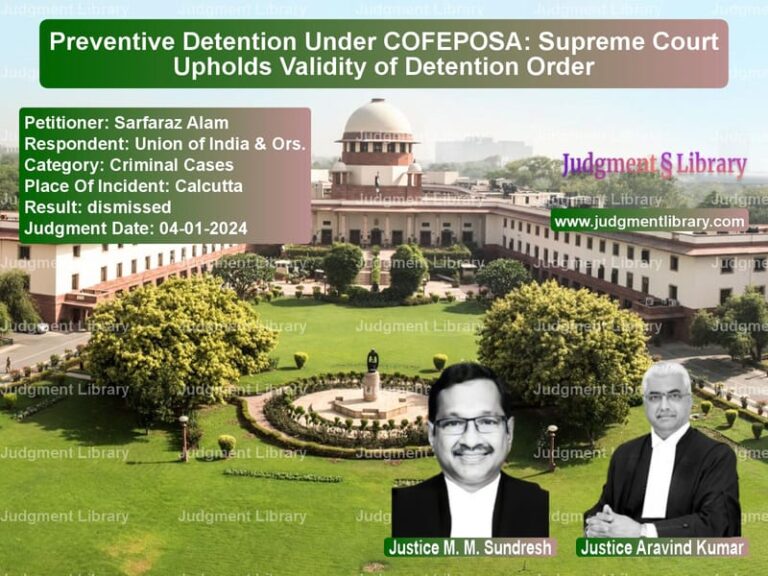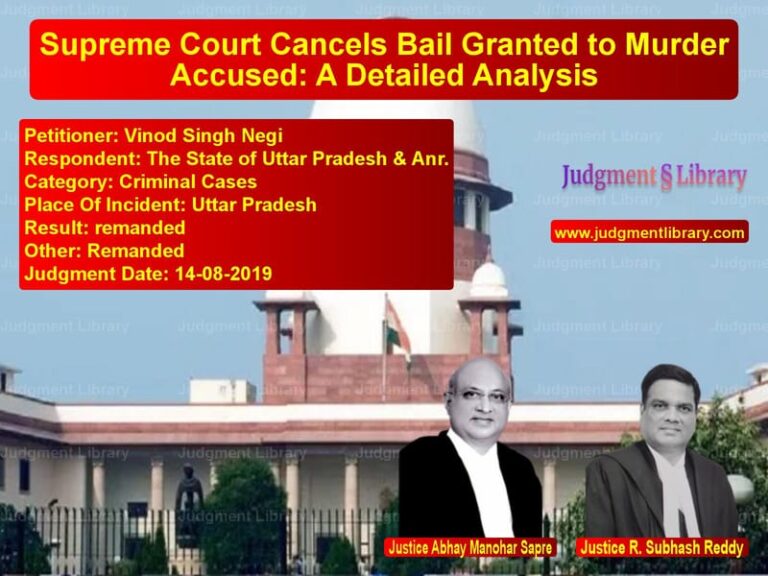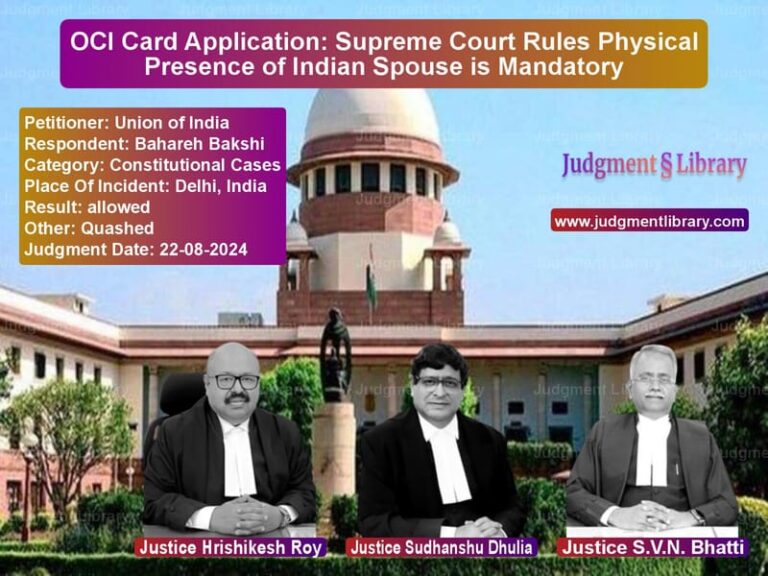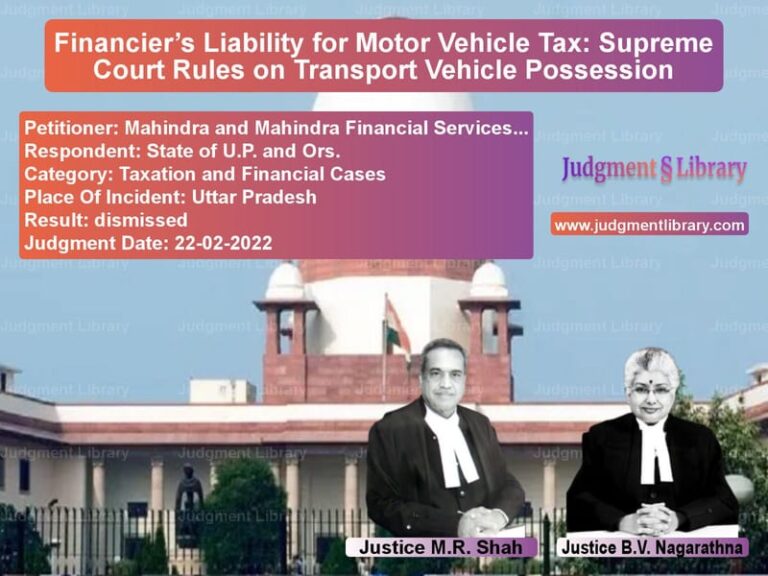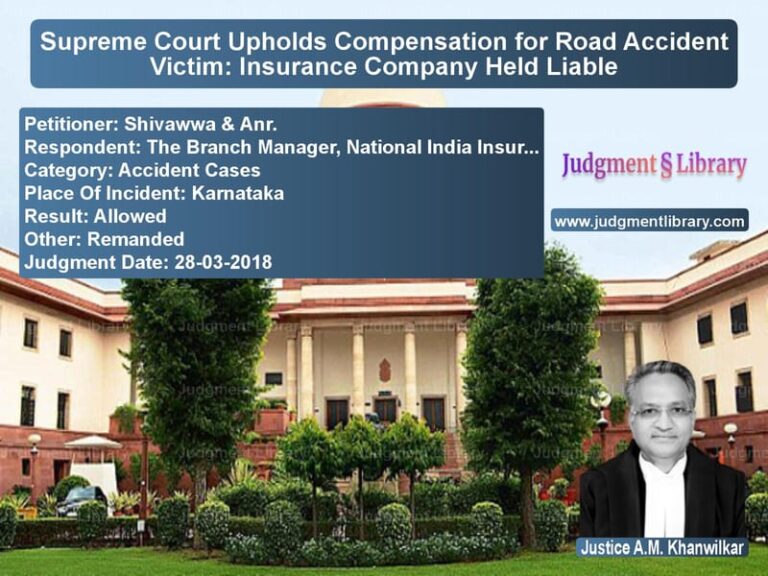Supreme Court Cancels Anticipatory Bail in Dowry Death Case: Key Legal Insights
The Supreme Court of India in the case of Vipan Kumar Dhir vs. State of Punjab & Another addressed a crucial issue concerning the grant of anticipatory bail in a dowry death case. The Court set aside the High Court’s decision that had granted pre-arrest bail to the accused mother-in-law of the deceased woman. This judgment underscores the legal principles governing anticipatory bail, particularly in cases of grave offences like dowry deaths.
Background of the Case
The case arose from an FIR filed by the complainant, the father of the deceased, under Sections 304B, 302 read with 120B of the Indian Penal Code (IPC). The deceased was married to the son of the respondent-accused on July 28, 2017. Soon after marriage, she was allegedly harassed and physically tortured by her in-laws for dowry. Tragically, she died an unnatural death on October 2, 2017, under suspicious circumstances.
According to the prosecution, the deceased informed her father on September 30, 2017, that she had been physically abused again due to the family’s unmet dowry demands. The complainant assured his daughter that he would visit her matrimonial home the next day. However, before he could intervene, the accused allegedly poisoned the deceased on October 1, 2017, leading to her death the following morning. The cause of death was later confirmed through medical evidence.
Legal Proceedings Before the High Court
Following the FIR, the respondent-accused (mother-in-law of the deceased) applied for anticipatory bail in the Sessions Court, which was rejected on December 21, 2017. Subsequently, she approached the Punjab & Haryana High Court, where she initially withdrew her plea on March 8, 2018. However, taking advantage of an anticipatory bail granted to her younger son (the deceased’s brother-in-law) by the Supreme Court on October 22, 2019, she refiled her petition seeking similar relief.
During the pendency of this petition, the High Court granted interim bail to the accused on December 3, 2020. Taking note of her cooperation with the investigation and parity with her co-accused son, the High Court granted her anticipatory bail on January 28, 2021. Aggrieved by this order, the complainant moved the Supreme Court.
Supreme Court’s Observations
1. Distinction Between Grant and Cancellation of Bail
The Supreme Court reiterated that the parameters for granting anticipatory bail differ from those for its cancellation:
“Very cogent and overwhelming circumstances are necessary for an order directing the cancellation of bail, already granted. However, bail once granted should not be canceled in a mechanical manner.”
2. Conduct of the Accused
The Court noted that the respondent-accused had been evading arrest for over two years and was declared a proclaimed offender on April 23, 2018. The Court observed:
“The High Court overlooked the crucial fact that the respondent-accused remained absconding for more than two years and only joined the investigation after securing interim protection from arrest.”
3. Parity with Co-Accused
The Supreme Court rejected the High Court’s reasoning that the accused was entitled to bail on grounds of parity with her son:
“The allegations against the mother-in-law were materially different from those against her son. The High Court erred in extending the benefit of parity where specific allegations were made against the respondent-accused.”
4. Nature and Gravity of the Offence
The Supreme Court emphasized the seriousness of the allegations:
“A young woman met with an unnatural death in her matrimonial home within three months of her marriage. The allegations in the FIR, supported by medical evidence, warrant a thorough investigation.”
Final Judgment
Setting aside the High Court’s order, the Supreme Court directed the respondent-accused to surrender before the trial court within one week. The Court clarified that after surrender, the accused was free to seek regular bail, which the trial court would decide on its merits.
Key Takeaways from the Judgment
- Anticipatory bail should not be granted lightly in serious offences like dowry deaths.
- Absconding from investigation weakens the case for bail, especially when the accused is declared a proclaimed offender.
- Parity with co-accused is not an absolute ground for bail; the role of each accused must be independently assessed.
- The Supreme Court prioritizes a fair trial and ensures that justice is served in cases of grave offences.
Conclusion
This ruling reaffirms the judiciary’s commitment to ensuring justice in dowry death cases. It highlights the responsibility of courts in granting anticipatory bail, particularly in cases involving serious allegations of harassment and unnatural death in matrimonial homes.
Judges: The judgment was delivered by N.V. Ramana, Surya Kant, and Hima Kohli.
Petition Result: Allowed
Petitioner Name: Vipan Kumar Dhir.Respondent Name: State of Punjab and Another.Judgment By: Justice N.V. Ramana, Justice Surya Kant, Justice Hima Kohli.Place Of Incident: Punjab, India.Judgment Date: 04-10-2021.
Don’t miss out on the full details! Download the complete judgment in PDF format below and gain valuable insights instantly!
Download Judgment: vipan-kumar-dhir-vs-state-of-punjab-and-supreme-court-of-india-judgment-dated-04-10-2021.pdf
Directly Download Judgment: Directly download this Judgment
See all petitions in Dowry Cases
See all petitions in Domestic Violence
See all petitions in Alimony and Maintenance
See all petitions in Attempt to Murder Cases
See all petitions in Bail and Anticipatory Bail
See all petitions in Judgment by N.V. Ramana
See all petitions in Judgment by Surya Kant
See all petitions in Judgment by Hima Kohli
See all petitions in allowed
See all petitions in supreme court of India judgments October 2021
See all petitions in 2021 judgments
See all posts in Criminal Cases Category
See all allowed petitions in Criminal Cases Category
See all Dismissed petitions in Criminal Cases Category
See all partially allowed petitions in Criminal Cases Category


